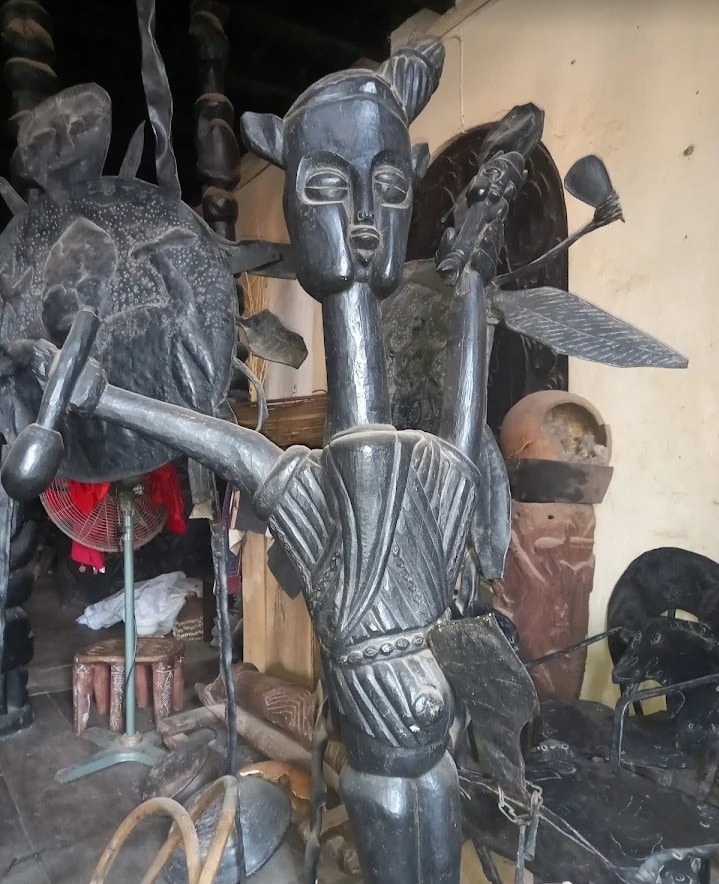Exploring the life and art of Ajibike Ogunyemi, a leading Nigerian sculptor whose metalworks preserve Yoruba spirituality through contemporary expression.
The image depicts a striking metal sculpture created by Ajibike Ogunyemi, one of Nigeria’s most respected contemporary sculptors. A native of Osogbo, Osun State, Ogunyemi is widely known for his mastery of metalwork and his connection to the New Sacred Art movement, which blends traditional Yoruba spirituality with modern artistic innovation. His works embody the living relationship between art, religion, and identity in southwestern Nigeria.
Early Life and Cultural Background
Ajibike Ogunyemi was born and raised in Osogbo, a historic Yoruba city celebrated for its rich cultural traditions, craftsmanship, and devotion to the goddess Osun, the deity of fertility, love, and rivers. Growing up in such an environment, Ogunyemi was surrounded by a thriving community of artists, carvers, and craftsmen inspired by Yoruba cosmology.
His artistic journey began under the influence of the Osogbo art movement, a collective of Nigerian artists who redefined African art during the mid-20th century. This movement was notably influenced by Austrian artist and priestess Susanne Wenger, who, along with local collaborators, revitalised the Osun-Osogbo Sacred Grove through sculpture, painting, and shrine design. Ogunyemi’s deep appreciation for Yoruba spirituality and his natural skill in metalwork positioned him as one of the heirs to this enduring legacy.
The New Sacred Art Movement
Ogunyemi’s association with the New Sacred Art movement is central to his identity as an artist. Founded in the 1960s by Susanne Wenger (Adunni Olorisha) and a circle of Yoruba artists, this movement sought to restore and preserve the sanctity of Yoruba religious sites, especially the Osun-Osogbo Grove — now recognised as a UNESCO World Heritage Site.
The group’s members, including artists like Adebisi Akanji, Buraimoh Gbadamosi, and Jimoh Buraimoh, dedicated their craft to creating sculptures that depict Yoruba deities (Orisha) and mythological scenes. Ogunyemi emerged as one of the prominent sculptors of the second generation of this movement, known for his bold use of metal as a primary medium.
His works often feature symbolic forms inspired by Yoruba cosmology — serpents representing transformation, birds symbolising divine messages, and human figures embodying ancestral spirits.
Artistic Style and Medium
Unlike earlier Yoruba sculptors who primarily used wood, Ajibike Ogunyemi is known for his innovative use of metal. His sculptures often feature welded iron sheets, rods, and recycled materials, shaped into elaborate forms that reflect both spiritual and environmental awareness.
The choice of metal not only represents strength and durability but also connects to Yoruba notions of Ogun, the god of iron and war. In many of his works, Ogunyemi subtly references this deity, celebrating the spiritual power of metal as both a creative and protective force.
Through texture, scale, and rhythm, his sculptures evoke a sense of movement and ritual energy — as if the figures themselves are engaged in eternal dance with the divine.
Connection to Yoruba Religion and Symbolism
Ogunyemi’s art draws deeply from Yoruba mythology, where every creation embodies a link between the physical and spiritual worlds. His pieces are not merely decorative; they are ritual instruments designed to maintain the balance between humanity and the gods.
Many of his sculptures are installed within the Osun-Osogbo Sacred Grove, where they serve as guardians of shrines, paths, and altars. These works continue the Yoruba tradition of sacred art — not confined to galleries but integrated into daily worship and community life.
By reimagining traditional forms in modern materials, Ogunyemi ensures that Yoruba spirituality remains relevant in the 21st century.
Legacy and Influence
Ajibike Ogunyemi’s contribution to Nigerian art goes beyond aesthetic innovation. His work symbolises the continuity of Yoruba culture amid rapid modernisation. Through his sculptures, he has bridged generational and cultural gaps, ensuring that sacred Yoruba symbols remain alive in the global art scene.
He has exhibited his work both locally and internationally, contributing to Nigeria’s growing reputation in contemporary art. Many of his pieces are preserved in museums, galleries, and spiritual sites, particularly in Osogbo, where his artistic journey began.
Ogunyemi is often described as one of the spiritual successors of Susanne Wenger, continuing her mission to protect and celebrate Yoruba sacred spaces through art.
References
1. UNESCO World Heritage – Osun-Osogbo Sacred Grove
2. Drewal, Henry John. Yoruba Ritual: Performers, Play, Agency. Indiana University Press, 1992.
3. National Commission for Museums and Monuments (Nigeria) – Artists of the Osogbo School.
4. African Arts Journal, Vol. 35, No. 2 (2002) – The Osogbo Artists and the Sacred Grove Tradition.
FOLLOW US ON:
FACEBOOK
TWITTER
PINTEREST
TIKTOK
YOUTUBE
LINKEDIN
TUMBLR
INSTAGRAM































